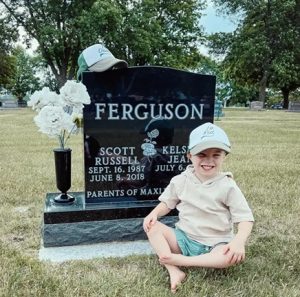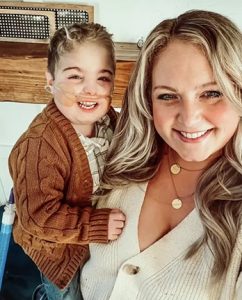Blog
“He died 4 days before his son was born.” Scott & Kelsey’s Vasculitis Story

They never expected it.
“Scott passed away four days before he could have met his son,” Kelsey, his wife, told me. “I am reminded every day. It hurts.”
For several weeks, he had been sick: cough, body aches, fever, joint pain. Until one night he began coughing up blood and couldn’t catch his breath. He went to the ER and was admitted. Leading up to that night, Kelsey said, “His illness was misdiagnosed as everything under the sun.”
Scott entered the hospital on Monday, June 4, 2018. He was diagnosed with granulomatosis with polyangiitis (GPA) vasculitis on Wednesday. He passed just after midnight on Friday morning. It was the first time he and Kelsey had ever heard of vasculitis.
Kelsey never wanted to get married. “I was adamant,” she said. “My parents are divorced; it felt like everyone around me was divorced.” But two weeks after she met Scott at St. Cloud State University in Minnesota, she knew: he was the one.
To Kelsey, Scott was “larger than life.” “He was big,” she told me. “Six foot six, 350 pounds; a football player who loved the Green Bay Packers.” He was the kind of person everyone knew. “We’d be on a trip and run into people who knew him at the airport. Or at a random dive bar. He wasn’t even from here, “ she laughed, alluding to his Canadian roots. “But he was kind and generous; he was friends with everyone.”
On her blog, Kelsey wrote, “Scott Russell Ferguson was my husband. The best husband. I know many people out there say that, but he truly was. And I told him all the time.”
Scott would have been “the fun dad.” When he and Kelsey spent time with their nieces and nephew, he doted on them, and always teased, “Why can’t we give them ice cream for dinner?”
When he found out Kelsey was pregnant, he was ecstatic. “He talked about it constantly,” she said. He sold cars and he told every single customer. “He would send me photos of babies all the time,” Kelsey laughed. “He’d walk up to strangers at the grocery store and ask how old their baby was. He loved kids so much.”
 Five years before their son, Maxley, was born, they had his name picked out. Scott couldn’t wait to be a father.
Five years before their son, Maxley, was born, they had his name picked out. Scott couldn’t wait to be a father.
Kelsey was already in the hospital when Scott was admitted on Monday, June 4. She had a high-risk pregnancy and the doctors wanted to be ready. Scott’s arrival at the ER soon after was unexpected, but not alarming. “He was having a hard time getting his oxygen levels up and was getting frustrated,” she said. “I knew it would take some time for him to get better, but we thought he would get discharged on Thursday or Friday.”
But by Thursday morning when Kelsey texted Scott from her room in the hospital’s Mother Baby Center, she didn’t hear back. She figured he was sleeping and didn’t want to wake him up. That night, the nurses insisted she try to get some sleep. Shortly after midnight, Scott’s doctor appeared in her room: Scott had gone into cardiac arrest. Fruitlessly, they tried to get him on ECMO. But there was bleeding in his lungs; they couldn’t stop it. There was nothing more they could do.
In a wheelchair and in the haze of her shock, Kelsey was rolled to Scott’s bedside. “In his final moments,” she said, “I told him how much I loved him, how much our son loved him.” She held his hand. She remembers hugging him. “It was by far the hardest thing I have ever had to do. I didn’t want to leave him.” As she dry heaved and nearly fainted, her mom and sister wheeled her away, back to her own hospital room in the Mother Baby Center.
Scott died that night, June 8, 2018.
 Maxley Russell Ferguson came into the world on June 12, 2018, at 2:56am. He was 2lbs 4oz and 14.25 inches long. He was born with a heart defect and a chromosomal abnormality called 12q14. It means he’s missing a tiny piece on his 12th chromosome, which typically affects growth and development.
Maxley Russell Ferguson came into the world on June 12, 2018, at 2:56am. He was 2lbs 4oz and 14.25 inches long. He was born with a heart defect and a chromosomal abnormality called 12q14. It means he’s missing a tiny piece on his 12th chromosome, which typically affects growth and development.
When I asked Kelsey how she held such extremes at once—devastating loss and new life—she responded, “I didn’t.” In the four days after Scott died before Maxley was born, Kelsey felt far from her body and her life: “I don’t remember anything from those four days.”
In fact, Kelsey is still struggling to make peace with those days. “I still haven’t dealt too much with Scott’s death,” she said, starting to cry. “I just jumped right into parenting a very sick, medically fragile child.” She spent a long time in therapy working to bond with Maxley. “That was a big thing that was robbed from me,” she said, “because I was grieving and I was so numb.” Her grief lingers weightily. While you’re never through with grief, hers has felt like a “huge obstacle.” “I have other friends that have gotten remarried in less time,” she said. “Five years later, I’m nowhere near dating.”
Maxley spent 99 days in the neonatal intensive care unit (NICU). Kelsey stayed with him, sleeping in his hospital room every night. It felt too heartwrenching to come home. “I couldn’t walk in the house,” she said. “It was too painful.” Her mom moved in with her and, together, they spent every night in the hospital beside Maxley, Kelsey on the couch, her mom on an air mattress.
In September, three days after what would have been Scott’s birthday, Kelsey and Maxley returned home together. They spent the next four months “cuddling, laughing, crying, and not sleeping” before returning to the hospital for Maxley’s planned open heart surgery.
 Today, Kelsey and Maxley include Scott in everything. “I reference him 30 times a day,” Kelsey said, laughing. She has photos of him throughout the house. She has quilts and a pillow made out of his clothes and a bear that, when you press it, plays a message in Scott’s voice.
Today, Kelsey and Maxley include Scott in everything. “I reference him 30 times a day,” Kelsey said, laughing. She has photos of him throughout the house. She has quilts and a pillow made out of his clothes and a bear that, when you press it, plays a message in Scott’s voice.
“We include him in the silly things too,” Kelsey said. “Maxley will burp and he’ll say, ‘Daddy heard that.’ We don’t put loved ones on a pedestal,” she insists.
Still, his absence weighs on their hearts. On Father’s Day, they visit Scott’s headstone and Kelsey grieves the fact that she’s not watching Scott and Maxley play catch in the yard or that they’re not making Scott breakfast in bed. Maxley has started asking, “Why is Daddy in Heaven?” Kelsey said, “It’s impossible to explain to a five-year-old why his daddy isn’t here to raise him and why Mommy cries a lot.”
All the time, Maxley says, “I miss Daddy.”
“There is no explanation for why Scott had to have vasculitis,” Kelsey said. “I try not to sit in the anger; it isn’t going to do me any good.” Though it’s hard, sometimes, for her not to ask, “Why me?”
“Scott shouldn’t have passed,” she said. “He could have fought this. He could have lived with it.” She is committed to raising vasculitis awareness because she never wants any other family to deal with what they went through. “People don’t know about vasculitis, which is why it gets missed.” Kelsey wants to change that: she wants to bring the disease into the light.
 For Kelsey, there is both solace and sadness in connecting with others with vasculitis. “To see other people living, surviving, and thriving with this disease makes me feel good.” But it also reminds her: Scott could have lived with it, too.
For Kelsey, there is both solace and sadness in connecting with others with vasculitis. “To see other people living, surviving, and thriving with this disease makes me feel good.” But it also reminds her: Scott could have lived with it, too.
For a while, Kelsey felt alone in her grief. “I felt like no one else has been through what I have been through. But that’s not really the case.” She has found comfort in connecting with other widows. “We can be together and just say, ‘It sucks.’” With good intentions, people often try to offer her platitudes like, “What a great mom you are,” or, “You’re so strong.” But with the other widows, Kelsey said, “We can say it’s terrible and that’s okay. They’re not trying to make me feel better, not trying to fix it. Sometimes, we even make morbid jokes. If you’re not laughing, you’re crying.”
Grief is ceaseless; we carry it with us always. But Kelsey wants you to know that “it does get better.” Over time, your grief will shift. It will enter a new season. And there will be light. There will be laughter. Someday, your grief will exist alongside joy.
Written by Ashley Asti

